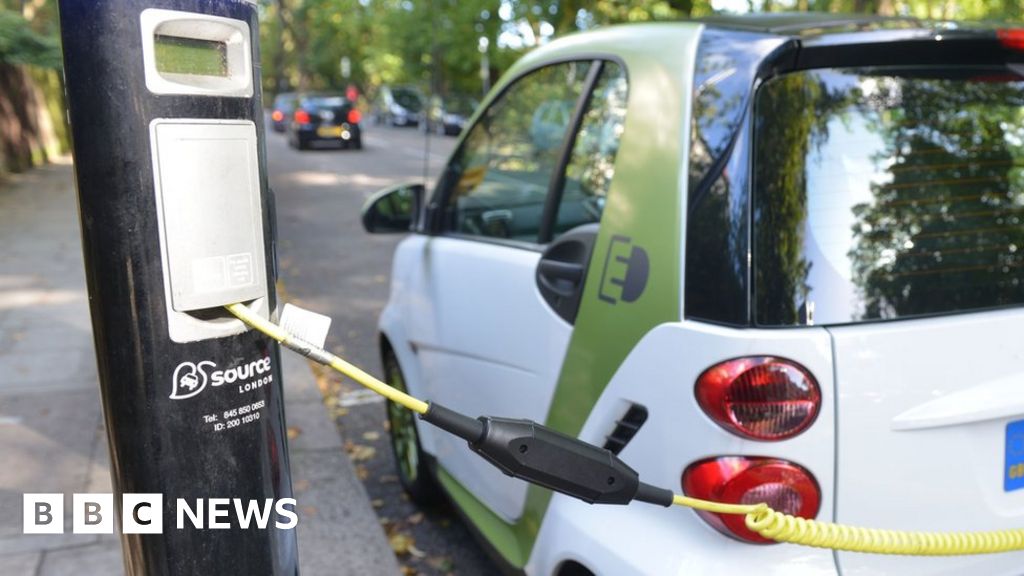Climate Change: Electric Car Target 'needs To Be Sooner'


The UK government's plan to ban the sale of new petrol and diesel cars by 2040 is too tame, advisers will say.
Drivers will benefit if electric cars come to dominate the new car market a full decade earlier, they will claim.
The Committee on Climate Change believes the cost of electric cars will be similar to that of petrol or diesel vehicles by 2024-5.
But the speed of installing charging points will have to radically improve to cope with the coming demand.
What is the current policy?
The UK government's current policy is to insist that by 2040, all new cars and vans sold in the UK should be zero emissions - that means electric or hydrogen.
But critics have pointed out that would mean some older petrol and diesel vehicles will still be on the roads after 2050.
That's the expected date by which the government should have reduced carbon emissions from all sources to zero.
Climate change: Where we are in seven charts
To keep carbon emissions down, look underfoot
Glimpsing a world beyond human extinction
'Nature's emergency is our emergency too'
How soon could British drivers be going all-electric?
The committee believes drivers can cash in by switching to zero-emissions vehicles when the price comes down.
It anticipates big savings in fuel and also in the costs of running and servicing an electric vehicle.
The committee will say 2030 would be a feasible date for the government to ban the sale of new petrol and diesel cars.
But members have to be sure their recommendations are achievable and they're not certain there will be enough cobalt in the world by then to build the batteries needed.
So I understand they'll recommend that the end date for new fossil fuel-powered cars should be 2035 at the latest.
When will there be an adequate charging network?
There's a big question mark over whether we will be able to reliably charge up. The committee has repeatedly warned the government that the installation of charging points is too slow.
MPs have weighed in, too. Mary Creagh, chair of the environment audit committee, told me: "Ministers are useless.
"They seem to think the market will miraculous provide charging point and the government has no job to regulate charging points."
From my own personal experience of borrowing an electric car for a long weekend, charging at motorway services was fine - but in deepest Dorset I tried two charge points provided by smaller firms, but both had software problems which made it impossible for me to get any power.
Is it possible to switch to all-electric by 2030?
AA President Edmund King says not. He said if battery manufacturers could find enough resources, electric cars might undercut petrol cars on price in the late 2020s.
But, he said: "On balance we feel that the 2040 target is about right and still challenging for industry and governments."
But Bloomberg New Energy Finance estimates that electric vehicles will compete on cost with petrol and diesel, starting in 2024. China will be in the lead, it says.
The Scottish government has a target of 2032 - and the insurance group LV is backing that. It said: "The UK is in a fortunate position in that motor manufacturers have already matched demand with a production line stacked with electric car and plug-in hybrid models, as the clamour from consumers' changes to cleaner motoring."
A source at the Department for Transport indicated that the government might consider bringing forward the switchover date if drivers were turning to electric cars more quickly.
He said the department was in talks with the Treasury over a plan to subsidise car charging points in people's homes.
This, he said, would be more economical than trying to get a comprehensive network of public charging points across the country.
Follow Roger on Twitter.
From Chip War To Cloud War: The Next Frontier In Global Tech Competition
The global chip war, characterized by intense competition among nations and corporations for supremacy in semiconductor ... Read more
The High Stakes Of Tech Regulation: Security Risks And Market Dynamics
The influence of tech giants in the global economy continues to grow, raising crucial questions about how to balance sec... Read more
The Tyranny Of Instagram Interiors: Why It's Time To Break Free From Algorithm-Driven Aesthetics
Instagram has become a dominant force in shaping interior design trends, offering a seemingly endless stream of inspirat... Read more
The Data Crunch In AI: Strategies For Sustainability
Exploring solutions to the imminent exhaustion of internet data for AI training.As the artificial intelligence (AI) indu... Read more
Google Abandons Four-Year Effort To Remove Cookies From Chrome Browser
After four years of dedicated effort, Google has decided to abandon its plan to remove third-party cookies from its Chro... Read more
LinkedIn Embraces AI And Gamification To Drive User Engagement And Revenue
In an effort to tackle slowing revenue growth and enhance user engagement, LinkedIn is turning to artificial intelligenc... Read more

